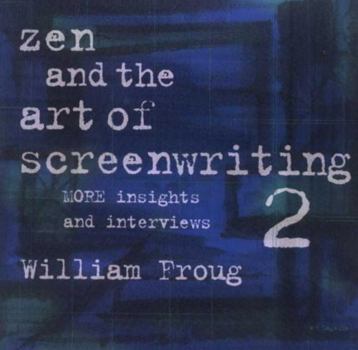Zen and the Art of Screenwriting 2: More Insights and Interviews
A tapestry of Froug's essays and interviews with top screenwriters, producers, and directors. Once again, Froug proves that he can skilfully pull engaging thoughts from his interviewees and, with his... This description may be from another edition of this product.
Format:Paperback
Language:English
ISBN:1879505568
ISBN13:9781879505568
Release Date:October 2000
Publisher:Silman-James Press
Length:330 Pages
Weight:1.40 lbs.
Dimensions:1.1" x 8.0" x 7.4"
Customer Reviews
1 rating
Excellent insights from some great screenwriters
Published by Thriftbooks.com User , 23 years ago
Having read about every screenwriting book that I can get my hands on, I find that these books typically fall into three categories. One, the book that promotes a certain formula for successful writing (see Syd Field). Two, the book that tells of a writer's experiences with the Hollywood scene and/or his/her take on the job of a screenwriter (see William Goldman), and then lastly, there is Bill Froug whose books decry the use of formulaic approaches to screenwriting and enthusiastically urge young writers to follow their muse and let the creative juices flow. Somewhere in the middle is my favorite, Linda Seger, who stops short of advising formulas but gives extremely practical advice for improving scripts. Nonetheless, Froug's books make for an enjoyable read, although he does aim squarely at the Syd Field crowd and makes no bones about it. Froug's stance on rigid structuring (for example, the 3-act structure) of screenplays has evolved over the years. In his book Screenwriting Tricks of the Trade, he expresses some skepticism about the use of such one-size-fits-all approaches to screenwriting. Well, here we are years later, and he has become not just annoyed at the purveyors of the fill-in-the-blank structure forumulas, but downright hostile toward them. He shreds Syd Field, calling into question his qualifications to have made lemmings out of an entire generation of screenwriters. It is a theme that Froug can't shake througout his book. He interviews several exemplary writers, Pierson, Sorkin, to name a couple, and his questioning is frank and yields some wonderful commentary from the writers. But he does clearly have an agenda to shout to the whole world that the great screenwriters themselves don't adhere blindly to writing formulas. Curiously, however, I found that about half the writers that he interviewed in the book, did adhere to certain structural conventions. Despite Froug's baiting, and to their credit, they were honest in discussing the need to have turning points at key points in their scripts. This is not a book to use as any kind of a reference on screenwriting, but merely to see how the pros really approach their endeavors. I must agree with Froug that too many of the gurus of screenwriting today don't actually write screenplays themselves. If they've got these fundamentals mastered, why not go for the big bucks? I like this book because it helped me resolve where I stand on the issue of structure formulas. If you're unsure where you stand on the debate, you might find the answer in this book as well.






